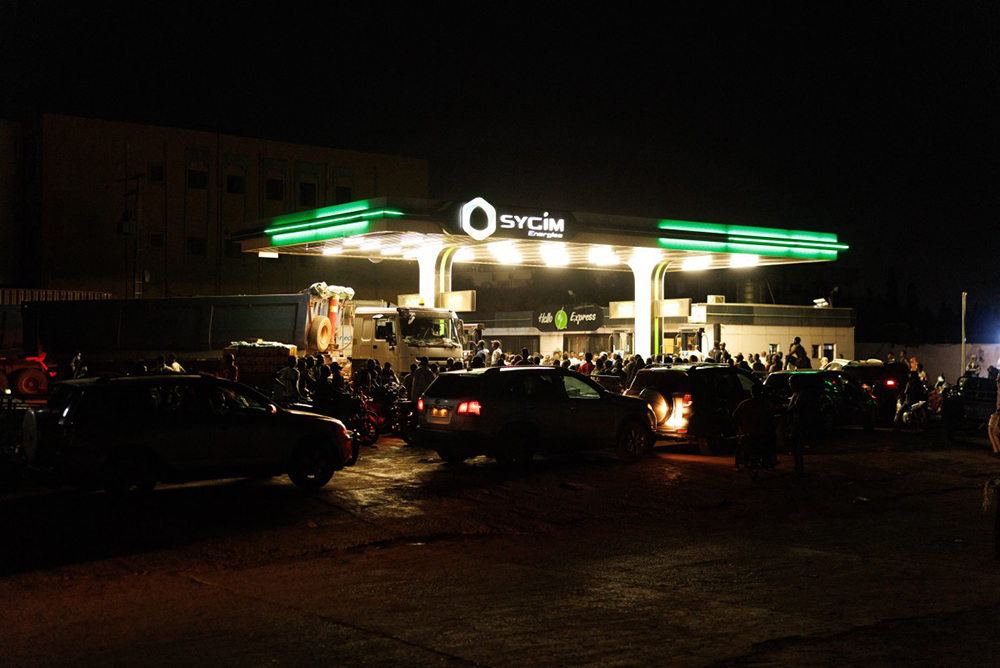Mali fuel running dry after a month of jihadist blockades
Since September, the jihadists have targeted fuel tankers, particularly those coming from Senegal and Ivory Coast, through which the majority of Mali's imported goods transit.
Vehicles queue up to get petrol at a service station in Bamako, on October 7, 2025. Since September the Group for the Support of Islam and Muslims (JNIM), affiliated with Al-Qaeda, has been targeting fuel tankers, particularly those coming from Senegal and Ivory Coast through which the majority of goods imported into Mali transit. Despite escorts by the Malian army several trucks have been set on fire and drivers and soldiers have been killed or kidnapped in jihadist ambushes. (Photo by AFP)
________________
In Mali, a month-long blockade by jihadists on fuel imports from neighbouring countries is beginning to seriously disrupt the landlocked Sahelian nation, where long lines form at the few remaining stations with petrol.
Since September, the jihadists have targeted fuel tankers, particularly those coming from Senegal and Ivory Coast, through which the majority of Mali's imported goods transit.
Despite a military escort, the enormous trucks' arrival in the capital Bamako is now a feat, with many having been set on fire, and drivers and soldiers killed or kidnapped in jihadist ambushes.
The resulting fuel shortages have become a massive disruption for Malians' day-to-day life.
"I spent all afternoon in queues and found nothing," a driver told AFP Tuesday. "This morning, unfortunately, I can't go out to make deliveries."
The jihadists, from the Al-Qaeda-linked Group for the Support of Islam and Muslims (JNIM), are retaliating against the authorities' ban on the sale of fuel at locations other than service stations in rural areas.
The move was meant to dry up the jihadists' fuel supply lines, according to authorities.
"The group is thus seeking to suffocate Bamako by cutting off its logistical arteries," the Dakar-based think tank Timbuktu Institute said late last month.
'No visibility'
Following the blockade, the nation's emergency fuel stock, which is meant to last three days, is now "exhausted", having been distributed for consumption, Mali's National Office of Petroleum Products (ONAP) told AFP.
Last week, around 10 tankers were burnt on the road from Ivory Coast, the ONAP said, adding that it had a "significant impact on our forecasts".
"To date we have no visibility on the end of the shortage and the country's adequate supply," it said.
While Bamako had been previously spared from the shortages thanks to its priority status as the capital, it now faces major issues.
"We have made it clear to the authorities that we cannot guarantee supply in the regions," a representative from Mali's oil professionals' association told AFP.
Since Monday, cars and motorcycles, as well as pedestrians with jerry cans, have queued in long lines in front of the few stations still open in Bamako.
"Since Monday, I've had all the difficulties in the world," one driver told AFP, explaining that he pushed his motorcycle about nine kilometres (six miles) without ever getting any fuel.
"Fuel will arrive in dribs and drabs," the oil professionals' association said, since "tankers can only depart with the authorisation of military escorts".
Vehicles queue up to get petrol at a service station in Bamako, on October 6, 2025. Since September the Group for the Support of Islam and Muslims (JNIM), affiliated with Al-Qaeda, has been targeting fuel tankers, particularly those coming from Senegal and Ivory Coast through which the majority of goods imported into Mali transit. Despite escorts by the Malian army several trucks have been set on fire and drivers and soldiers have been killed or kidnapped in jihadist ambushes. (Photo by AFP)
'Business is dying'
The shortage is only exacerbating recurrent, severe power outages that have plagued Mali for the last five years.
Electricity supply has been reduced to six hours a day in some areas, down from 19, "to allow oil tankers to serve gas stations first", a representative from the Energie du Mali electricity company told AFP.
"In some inland towns, the power supply has stopped due to a lack of fuel for our generators," the representative said. "In Bamako, we only supply power for six hours a day."
A resident of the southwest town of San told AFP the locality hadn't had electricity in more than two weeks.
A vendor in the central town of Mopti said her refrigerator was no longer cool all day and the fish that she sold were rotting.
"My business is dying," she said.
In Segou in central Mali "to get fuel, you have to queue early in the morning at 6:00 am to hope to get it by 3:00 pm", a resident told AFP.
Since Monday, butane gas has also been difficult to obtain in Bamako, according to reports posted on social media.
Since back-to-back coups in 2020 and 2021, Mali has been ruled by a military junta that has repressed dissent and stifled civil society.
Faced with the shortage, Mali's authorities on Tuesday extended the duration of tanker escorts and price controls at gas stations.
"This is only temporary, the situation will improve in the coming days," Soumaila Djitteye, the deputy director general of commerce, told reporters.
In mid-September, Malian Prime Minister Abdoulaye Maiga assured oil professionals that "even if we have to go and fetch fuel on foot with spoons, we will do so. We have no other choice."